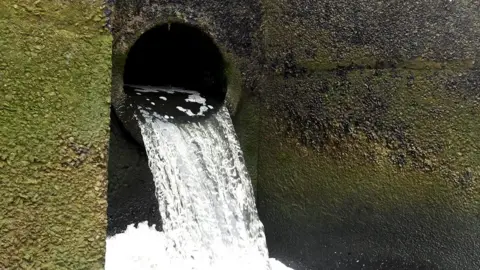The faulty water sector needs stronger regulations, the journal says

BBC climate and science
 Getty
GettyThe water sector in England and Wales fails and needs stronger regulations to better protect facilles and the environment, according to the provisional results of a historic examination.
The Independent Water Commission, led by the former vice-governor of the Bank of England, Sir Jon Cunliffe, said on Tuesday that the public's confidence had been shaken by “pollution, financial difficulties, mismanagement [and] Infrastructure failures “.
He added that a clearer orientation of the government was needed, a better approach to long -term investment and a stronger voice for local communities.
The examination was implemented by the government in October in the middle of the growing public concern concerning the spill of wastewater and the rise in bills.
When the examination was launched, the government had excluded the nationalization of the sector – arguing that it would be too expensive and would not necessarily lead to improvements.
“There is no simple and unique change, whatever the radical, which will provide the fundamental reset necessary for the water sector,” said Sir Jon.
“We have heard of deep, systemic and nested failures over the years – the failure of government strategy and planning the future, not protecting the bill and the environment and the failure of certain water companies and their owners to act in public, as well as their private interest.”
He added that a new legislation would be necessary.
In response to Sir Jon's conclusions, the secretary of the environment, Steve Reed, described the water system as “broken”, adding that the British government would respond in its entirety to the Commission.
A Welsh government spokesman also thanked the committee and said it was considering its conclusions.
Stronger role for regulators
Perhaps the strongest words of Sir Jon were on the role of regulators – the environmental agency, the natural resources of Wales and Ofwat – to ensure that private water companies act “in the public interest”.
Addressing BBC Breakfast, he said: “We are certainly talking about environmental regulators – the environmental agency [in England]Natural resources in Wales – Not only have more people and more resources, but also have modern technology so that they can monitor and so that they can follow and keep businesses to account. “”
“On the side of economic regulations [Ofwat]We really need a regulator close to companies, which supervises them and continuously monitors them, as we do in financial services with banks-not only so that they can intervene early … But so that they can help companies improve, “he added.
“Some of this has started, but it takes much more.”
The Water Commission added that it envisaged significant “rationalization and alignment of regulators” options to meet these challenges.
In response, the Environment Agency and Ofwat said they had praised temporary conclusions and would continue to work with Sir Jon and his team before the final report was submitted to the government.
At just over 100 pages, the provisional results of the Commission are a precursor of the main report, which should be published later this summer and give final recommendations.
The government will then decide what recommendations it wishes to implement.
The examination examined more than 50,000 responses submitted in the water sector, the public, environmental groups, regulators and the water industry.
“What we heard was clear: the current system does not provide what people expect and need,” said Sir Jon in a preface to the report.
The government has asked Sir Jon to focus on reforms in the water sector as a whole, rather than individual water companies.
“The water industry is perfectly aware of public dissatisfaction and loss of confidence,” said BBC Stuart Colville, deputy director of the commercial association of Water UK, at BBC Breakfast.
“What we hope for this commission … are a set of proposals that will help us restore this confidence by providing more and more quickly in response to the legitimate requests of the public.”
Environmental activists welcomed the call for greater regulations, but said that more attention should be devoted to water restructuring companies themselves.
“We have to … see how we can put the water companies in public advantages, put the quality of the water first and judge the performance according to how they take care of the environment and the customers,” James Wallace, CEO of River Action UK, at BBC Breakfast.
“It looks like a sales document for international investors and how to attract well paid executives, not how to clean our rivers,” he added.
 Media in Pennsylvania
Media in PennsylvaniaThe pressure on the water sector increases due to climate change, population growth and other factors – but it also suffers from decades of underinvestment.
Increased surveillance has led to a more in -depth examination in the amount of wastewater spilled in our rivers, lakes and seas. In total, the spills of the overflow pipes lasted more than 3.6 million hours in 2023 and 2024.
The release of raw wastewater in rivers and the sea can be legal if spills occur in wet weather, although it can always present risks for people and the environment.
But the The BBC previously discovered evidence probable spills also during dry days.
In April, Invoices increased on average by 26% In England and Wales, while regulators have approved the plans of water companies for billions of investment books. This aims both to improve water supplies and reduce the amount of overturned wastewater.
Responding to the interim conclusions of the Water Commission, Victoria Atkins, Shadow Environment Secretary, said the conservatives would examine and engage with the report.
“While in the government, we have taken measures to prohibit bonuses for the bosses of water companies that have committed criminal violations, we have continued water companies that illegally polluted our rivers and we delivered our ambitious commitment to ensure that 100% of storm overflows are monitored,” she added.
The spokesperson for the liberal democratic environment, Tim Farron, said: “At the heart of the wastewater scandal is a system of regulatory that failed.
“It's time for Ofwat to leave and the commission must now do this simple.”






